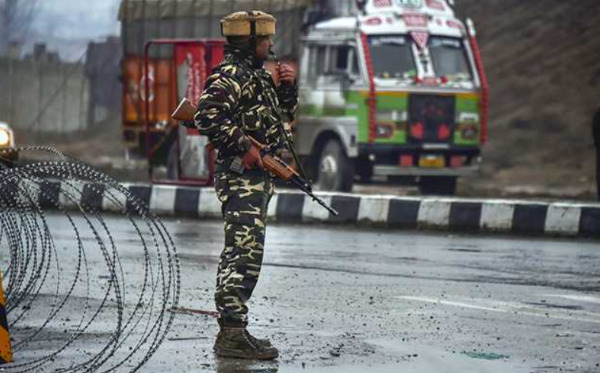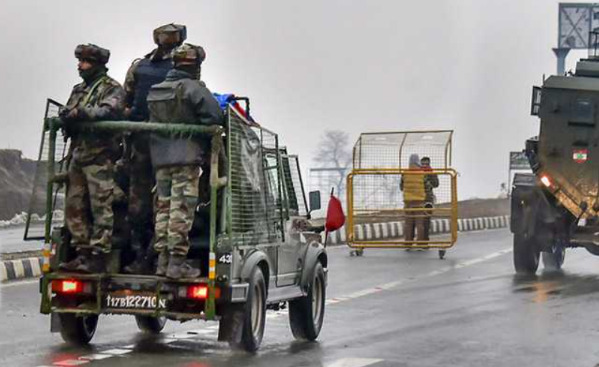Table of Contents
On the day when the world celebrates February 14th as the day of love, India witnessed a horrific incident, also known as the Black Day, which symbolizes a terror attack on February 14, 2019. There was a suicide bombing attack in Pulwama, where a bomber carried out a suicide explosion. A vehicle drove into a convoy of Indian paramilitary personnel, resulting in more than 40 CRPF security personnel casualties. Many of our brave soldiers lost their lives in this attack in Jammu. This raised chaos, anger, and terror among the country’s citizens.
In India, the Pulwama attack is also known as “Black Day” to represent the loss and honor of those who lost their lives. There are memorial events and prayers offered for the fallen soldiers. The militant group named Jaish-e-Mohammed claimed responsibility for the attack. This incident raised tensions between India and Pakistan, creating a series of confrontations and military clashes across the borders.
Black Day: What Happened on February 14th, 2019?
On February 14th, 2019, a Pulwama terror attack shook the country when a convoy of the Central Reserve Police Force (CRPF) was attacked in the Pulwama district of Jammu and Kashmir. This day is remembered as the Black Day of India. The convoy consisted of 78 vehicles, and over 2000 Jawans were attacked on this day. This attack was first reported as an LED explosion, and it was later clarified that a vehicle that contained explosives was driven into the convoy, resulting in the loss of 40 brave soldiers.
In response to this horrific incident, India took decisive action and conducted an air strike on the Jaish-e-Mohammad Balakot terror camp. The Indian government made a bold decision that implied India would not submit to any inhumane deed.
Black Day Pulwama Attack History
The conflict over Kashmir and its territories dates back a long time between India and Pakistan. Both countries claim that the region is entirely there. Currently, the region is divided among the two countries. India took control of union territories like Jammu and Kashmir, Ladakh and Pakistan, then Azad Jammu and Kashmir and Gilgit-Balistan.
In the 1990s, Pakistan supported an insurgency in Indian-administered Kashmir. Since 1989, that region has continuously had increased conflicts and chaos. Up to this point, over 70,000 people have died in this region. Since 2015, there has been an increase in suicide attacks. Some of the events were the Police station in Gurdaspur (2015), Pathankot Air Force in Pampore (2016), the Indian army army bridge in Uri (2016), etc. Many of these attacks occurred near the Jammu-Srinagar National Highway.
These conflicts in Jammu and Kashmir are the main reason for tension between India and Pakistan. There had been many efforts to resolve the issue diplomatically, but it never succeeded.

Black Day: What happened after the attack?
The attack on February 14th created everlasting pain and discomfort in the minds of the people of India and the world. This day is remembered as Black Day, as we lost many young, brave soldiers to the evergrowing terrorism in Asia. Let us know about the significant events after the unexpectedly horrific attack.
- The attack resulted in the loss of 40 CRPF personnel, which led to a nationwide outpouring of anger and grief. A black day indeed.
- State funerals for the brave soldiers were held, and the government of Punjab announced a compensation of Rs. 12 lakhs each to the families of soldiers from the state, along with job offers.
- India took specific diplomatic measures against Pakistan, like revoking the Most Favored Nation (MFN) status it granted Pakistan. Also, an increase in the customs duty on Pakistani imported goods to 200% was seen. India also urged the Financial Action Task Force (FATF) to put Pakistan on the blacklist.
- Kashmiri students faced backlash across India, including violence, harassment, and others. Many Indians also offered houses to the affected Kashmiris. Also, a few universities started expelling students and denying their admission.
- India carried out an airstrike against the group responsible for the attack in Balakot, Pakistan. Reports claimed that a large group of terrorists were killed during the attack.
- An Indian jet, MIG-21, was shot down over Pakistan, and its pilot was captured. However, the pilot was released after some time, which eased the tension between the two countries by a minimal amount.
- Pakistan arrested 44 individuals, including members of Jaish-e-Mohammed. Relatives of Jem Leader Masood Azhar, including his son Hamad Azhar and his brother Abdul Rauf, were among the arrested.
- Indian security forces conducted operations, killing several suspects in the attack and also arrested many of them.
These events highlight the complex consequences of the Pulwama attack, which not only resulted in the loss of lives but also impacted diplomatic relations and the lives of many citizens in India.

Black Day: What does the world have to say?
Following the Pulwama attack in 2019, many members of the international community condemned this inhumane act. The United States expressed strong condemnation of this cruel act. The US government condemned the attack and pledged to collaborate closely with the Indian government against terrorism. They also mentioned that Pakistan should stop providing shelter to the terrorists and cooperate fully with the ongoing investigations into the Pulwama incident.
Several other countries, including Bangladesh, Bhutan, China, France, Israel, Nepal, Sri Lanka, Saudi Arabia, Singapore, Turkey, the United Arab Emirates, and the United Kingdom, strongly condemned the Pulwama attack. The United Nations Secretary-General also joined in condemning the incident.
It is important to note that China and Turkey condemned the attack while supporting Pakistan’s anti-terrorism efforts. A resolution to designate Masood Azhar, the leader of the JeM, as a global terrorist was momentarily blocked by China, a permanent member of the UN Security Council. China and Turkey supported this action, but the other permanent members of the Security Council were against it.
Iran also supported India in its fight against terrorism following the attack in Pulwama and called it a black day in the history of the Nation. Abbas Araghchi, the deputy foreign minister of Iran, met with Sushma Swaraj, the minister of external affairs of India. Araghchi acknowledged the Khash-Zahedan suicide bombing in 2019 and the Pulwama attack during their meeting, and he emphasized the significance of Iranian and Indian cooperation in efforts to avert further terrorist attacks.
FAQs on Black Day
When did the Pulwama attack take place?
Pulwama attack took place on February 14, 2019. A vehicle loaded with explosives collided with the army convoy, resulting in many brave soldiers' deaths
What is Black Day in India?
The Pulwama attack is also known as Black Day to represent the loss and honor of those who lost their lives. There are memorial events and prayers offered for the fallen soldier






